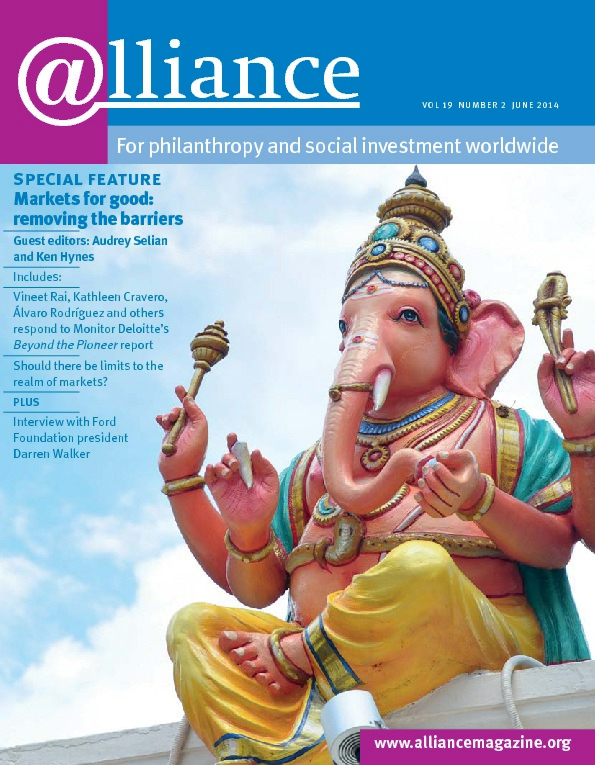From strategic and business planning to marketing and fundraising, there seems to be no shortage of consultants ready to help non-profits meet all kinds of needs. But should they be thought leaders too?
 Because they are removed from the day-to-day experience of the average non-profit or foundation and have a breadth of perspective that comes from working with different types of organization, consultants can provide important insights to the larger sector.
Because they are removed from the day-to-day experience of the average non-profit or foundation and have a breadth of perspective that comes from working with different types of organization, consultants can provide important insights to the larger sector.
But when is that thought leadership adding value to the sector and when is it just a means for hawking a consultant’s wares?
At a recent conference, a consulting firm president suggested his shop’s model was the only way to achieve social change, which caused some participants to shift in their seats. As one participant put it: ‘It’s because they’re consultants. If there’s only one solution and that’s the one they offer consulting on, that’s the approach they promote.’
There is, after all, a difference between introducing ideas to spark new thinking and marketing particular frameworks to build a consultant’s brand. At the end of the day, it all comes down to value. Is a consultant adding value by introducing new approaches, raising hard questions, highlighting important trends, or suggesting necessary changes to systems and structure, the hallmarks of thought leadership? Or are they using ideas to package what they’re selling?
Here are some key questions that might help us to make that distinction:
1 Is what the consultant is presenting really new or just something old with new packaging?
We’ve all fallen victim to shiny object syndrome. The next new thing can seem so appealing that it’s easy to believe the hype, but it isn’t necessarily applicable or even appropriate for many organizations. Before embracing a new approach, it’s important to determine whether it actually applies to the specific situation at hand.
2 Has the consultant’s new framework been tested?
If the new idea is really worthy of broad adoption, there should be evidence of its value. Consultants need to be transparent about whether they have this evidence and, if so, how it was collected. Was it a randomly sampled population or a few focus groups of satisfied clients? Consultants, like other thought leaders, sometimes ignore the fact that the big ideas they’ve envisioned may not work on the ground.
3 Does what the consultant is proposing embrace the complexity of the situation?
Social challenges are inherently difficult to resolve because change takes time and requires grappling with the messiness of ‘wicked problems’, which don’t usually respond to one best practice or even a set of discrete interventions. Wicked problems don’t come from somewhere; they come from somewheres. And so do the solutions. True thought leadership emerges from understanding and integrating a problem’s inherent complexity into a potential resolution.
4) Is the consultant willing to engage in thoughtful debate about their ideas with those who may disagree?
Thought leaders who are genuinely interested in moving a field invite feedback, including criticism, because they know open and honest discussion can strengthen the original idea. They’re also eager to make their ideas broadly accessible so that they become part of the larger field.
5) Are influential people hailing the new idea as definitive when there may be little hard evidence to suggest that it is?
While it’s nice to have the endorsement of influential people, this can sometimes be a shield against real critique. It can also suggest an echo chamber at work, where the hype around the idea is bigger than the actual value of the idea itself.
There’s no question that it’s difficult, if not impossible, to separate good marketing – which every consultant must do to survive financially – from real thought leadership.
We think that consultants can and should have opportunities to stand away from their business and share what they’re learning. Like other thought leaders, they can lift us out of our individual circumstances and move us to see a bigger picture.
That isn’t always easy, especially when consultants’ thought leadership is controversial. But good thinking that has the potential to transform minds and entire fields, even when it may be inimical to a brand, can sometimes lead to impact that may not be easily achieved by focusing only on clients’ individual needs. The key is knowing when and where that kind of thought leadership will add value.
Cynthia M Gibson is an independent consultant who works with a wide range of non-profits and foundations. Email cingib@gmail.com
Nell Edgington is president of Social Velocity. Email nell@socialvelocity.net






Comments (0)